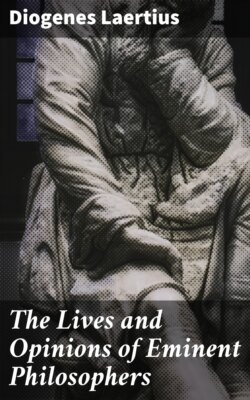Читать книгу The Lives and Opinions of Eminent Philosophers - Diogenes Laertius - Страница 18
На сайте Литреса книга снята с продажи.
ОглавлениеGold is best tested by a whetstone hard,
Which gives a certain proof of purity;
And gold itself acts as the test of men,
By which we know the temper of their minds.
III. They say, too, that when he was old he said, that he was not conscious of having ever done an unjust action in his life; but that he doubted about one thing. For that once when judging in a friend’s cause he had voted himself in accordance with the law, but had persuaded a friend to vote for his acquittal, in order that so he might maintain the law, and yet save his friend.
IV. But he was most especially celebrated among the Greeks for having delivered an early opinion about Cythera, an island belonging to Laconia. For having become acquainted with its nature, he said, “I wish it had never existed, or that, as it does exist, it were sunk at the bottom of the sea.” And his foresight was proved afterwards. For when Demaratus was banished by the Lacedæmonians, he advised Xerxes to keep his ships at that island: and Greece would have been subdued, if Xerxes had taken the advice. And afterwards Nicias, having reduced the island at the time of the Peloponnesian war, placed in it a garrison of Athenians, and did a great deal of harm to the Lacedæmonians.
V. He was very brief in his speech. On which account Aristagoras, the Milesian, calls such conciseness, the Chilonean fashion; and says that it was adopted by Branchus, who built the temple among the Branchidæ. Chilo was an old man, about the fifty-second Olympiad, when Æsop, the fable writer, flourished. And he died, as Hermippus says, at Pisa, after embracing his son, who had gained the victory in boxing at the Olympic games. The cause of his death was excess of joy, and weakness caused by extreme old age. All the spectators who were present at the games attended his funeral, paying him the highest honours. And we have written the following epigram on him:—
I thank you, brightest Pollux, that the son
Of Chilo wears the wreath of victory;
Nor need we grieve if at the glorious sight
His father died. May such my last end be!
And the following inscription is engraved on his statue:—
The warlike Sparta called this Chilo son,
The wisest man of all the seven sages.
One of his sayings was, “Suretyship, and then destruction.” The following letter of his is also extant:—
